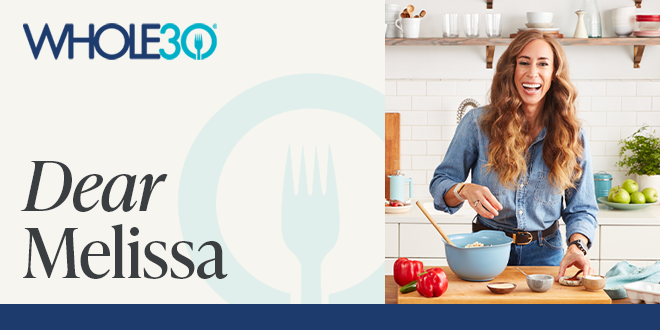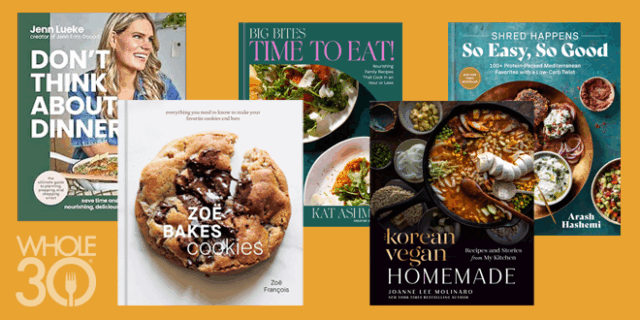Dear Melissa,
My husband is away for work often, and being home alone for days on end makes my Food Freedom plan go right out the window. Why is it so much harder when I’m home by myself, and how can I better navigate my food freedom under these circumstances? –Liz, San Francisco, CA
Dear Liz,
This is a common occurrence. I bet many of us find that our “is it worth it, do I want it?” queries get much looser (or disappear entirely) when there’s no one there to witness or judge our behavior. The last time my husband went out of town, I ordered Coldstone delivery the very first night. Though we’ve ordered ice cream together at least a dozen times, on this night, the idea of eating a sundae all by myself on the couch while watching Netflix was just too luscious to pass up. (Was it worth it? Only kind of physically, but 100% emotionally!!)
The difference, though, is that you seem bothered by your food freedom choices when you’re home alone, and I relished that special occasion without any guilt, negative self-talk, or self-judgment, staying true to my Food Freedom plan in the process. I’m going to assume that your husband doesn’t judge or criticize you for what you eat when he is home, so let’s unpack what else could be happening here. I’ll give you four potential scenarios.
1. The sneaky effects of a diet mindset
You may find yourself gravitating towards certain foods (like sweets, chips, soda, or wine) because you’re still working to shed the “diet mindset.” You’ve been told all your life that certain foods are “bad,” and you’re “being bad” or “naughty” when you eat them. It made us believe indulging in some foods was shameful, or that these indulgences should be done quietly or in secret.
You may still have some of this lingering, even after your Whole30. (A lifetime of messaging is hard to erase.) If this is how you’re going into your time alone, it makes sense that you’d jump at the opportunity to indulge in the foods you’ve been depriving yourself of for fear of being judged.
If you have been feeling deprived, even in your food freedom, could you recommit to working the plan and trusting your body whether your husband is home or not? If it is worth it and you do want it, go ahead and enjoy it. That is your food freedom! And if you decide it’s not worth it or you don’t want it, you won’t feel deprived, because it was your decision in the first place.
Action Item:
Re-read Food Freedom Forever (or skim the pertinent sections). Then, take a good, hard look at your Food Freedom plan when your husband is home. If you ask yourself, “Is it worth it, do I want it,” and the answer to both is yes, are you still depriving yourself of that food out of fear or anxiety? Do you have a hard time embracing the idea that there are no bad foods, that you are not bad (or good) based on the foods you eat, and that you can trust your body to make the choices that are right for you? If that’s part of what is driving your food choices when you’re home alone, a trained therapist or counselor can help you work through these beliefs and concerns.
2. Home alone (like the movie)
There’s something about being home alone (or traveling alone) that can make us feel like a 12-year-old left without a babysitter for the very first time. It’s so exciting! No one is watching! You can do anything you want! You can have popcorn and wine for dinner or stay up late eating cupcakes in bed while watching Love is Blind and NO ONE WILL JUDGE YOU.
If you’re an introvert (or if you’ve been living with someone for a long time), having the house to yourself can feel like a celebration, and it’s only natural that you’d want to go big in taking advantage of your newfound freedom. Sometimes, that involves the popcorn and wine I mentioned. However, there are plenty of other ways you can enjoy the house and your solitude that don’t involve food. If you haven’t taken the time to imagine how you can truly rejoice in your alone time, now is your opportunity!
Action Item:
Make a list of all the ways you can celebrate your alone time outside of food or drink, so you have even more options of satisfying your 12-year-old urges while adhering to your Food Freedom plan. Walk around in your underwear (or maybe even naked). Take a long, uninterrupted bath. Cook a fancy dinner and eat in peace and quiet in a leisurely fashion. Use all the hot water, or don’t shower at all. Use the incense your spouse hates, turn off all the big lights, sleep with the dog, go to bed at 7:30 PM, stick your nose in a book over dinner, or have a dance party after work. Celebrate your alone-ness in a variety of ways, and maybe the need or desire to celebrate with food becomes less urgent.
3. Stress, loneliness, and anxiety
Often, being home alone brings about stress. Maybe you’re solo-parenting while your spouse is gone, or taking on far more pet-care or household responsibilities. You may feel lonely, missing the companionship. Or maybe being home alone is scary, leaving you sleeping poorly and feeling generally anxious.
It’s biologically normal to see an increase in cravings when you’re under stress, especially if the current stress of being home alone is on top of chronic stress (like financial concerns, lack of sleep, job pressures, an illness or injury, or relationship issues). Because of this stress, it’s understandable that you’d fall back into the old habit of automatically reaching for food as comfort.
Action Item:
Think about the circumstances around you reaching for comfort foods when you’re home alone. Are they tied to a particular emotion, like feeling overwhelmed or anxious? Do they tend to happen at a certain time of day, like in the evening, when you’re usually curled up with your spouse watching a movie? Are you grabbing-and-going with whatever you can get your hands on because you’re far too busy to make a meal? Getting curious about the when, where, and why of your eating habits when you’re home alone can unearth valuable insights, and help you realize there are valid reasons for your habits to change under these circumstances. Those realizations can give you the impetus to find other ways to feel secure, comforted, and cared for during his trips.
4. The “it’s just me” mentality
The last reason you may find yourself sliding into chocolate and chips for dinner is that it’s a lot more cumbersome to prepare tasty, home-cooked meals for just one person. Without anyone else to cook for (or eat with), it can be hard to motivate yourself to meal plan, prep, cook, and clean—and that may lead to, “I’ll just call for pizza/eat dark chocolate and ice cream/go out.”
Maybe you want to eat more home-cooked meals and Whole30-ish snacks when you’re home alone! But without a solid plan and some reasonable accommodations, you’re just gravitating towards whatever is in the pantry, or whatever catches your eye as you’re trolling the supermarket, hangry and tired at 6 PM. This is perhaps the easiest fix, because a little planning will go a long way.
Action Item:
Create a plan—but make it realistic. Cook some freezer meals for easy reheating, order some Made By Whole30 meals for delivery. Pull some favorite familiar recipes from a cookbook or the Whole30 recipe site for the week—ideally meals you can double for leftovers, or cook effortlessly in a slow cooker. Buy ingredients (like a rotisserie chicken, pre-cooked veggies, and a dressing or sauce) to throw dinner together in a jiffy. Make it easy for yourself to eat well while you’re home alone, while letting yourself be a little more relaxed in the process.
Food freedom is a practice
Don’t beat yourself up for your habits slipping when your situation changes, especially if you’re a creature of routine. Awareness is the first step in keeping yourself on an even keel when you find yourself home alone. Making a plan is the next. The more you practice creating new routines, meal strategies, and habits when you’re on your own, the easier it will be to put these into practice. Oh, and I highly recommend instituting a “no pants needed” rule first. Just sayin’.
Best in health,
Melissa
Disclaimer: This page contains affiliate links. We earn a small commission when you purchase through these links.















